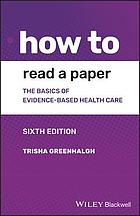
If you want to do a thorough search of the literature on a topic, it is best to use a database. Bibliographic databases enable you to search across journal articles and other academic and scientific publications worldwide. They provide a more comprehensive search than Library Search, as they go beyond Library collections. These databases enable you to search for the primary literature i.e. the original research studies.
For Dentistry, the Web of Science Core Collection is recommended initially for undergraduate coursework, as it is relatively easy to use, covers all academic disciplines, and enables you to browse citation networks of the publications you find:
Search the world’s leading scholarly journals, books, and proceedings in the sciences, social sciences, and arts and humanities.
Includes: Science Citation Index; Social sciences Citation Index; Arts and Humanities Citation Index; Arts and Humanities Citation Index; Conference Proceedings Citation Index - Science; Conference Proceedings Citation Index - Social Science & Humanities.
Medline (on Ovid) is the key database for searching the Dentistry journals, and uses Medical Subject Headings (MeSH) to make searching more comprehensive [Note: contains almost identical data to PubMed, so you don't need to search both]:
International literature on biomedicine, including the allied health fields and the biological and physical sciences, humanities, and information science as they relate to medicine and health care.
If you are doing a full systematic review, Embase and Medline are the two databases recommended by Cochrane, as the minimum requirement for a systematic search of the medical literature.
A database of articles published in the fields of medicine, biomedical science and related areas. It is particularly good for pharmacology and associated subjects.
For wider searches of the Dentistry literature you might find these resources useful:
Tool for studying human anatomy through three-dimensional means. Includes images of real, dissected human anatomical specimens, and encompasses the upper limb, lower limb, trunk, head and neck, and internal organs. Please note: users can set up a personal account once logged in - but need to access the account every 60 days to ensure it remains active.
Database of complementary medicine, physiotherapy, occupational therapy, rehabilitation, podiatry, and palliative care.
CINAHL includes journal articles, books, dissertations, conference proceedings and standards of practice related to nursing, biomedicine, health sciences librarianship, alternative/complementary medicine, consumer health and allied health disciplines.
PubMed contains references to journal papers from Medline and life sciences journals.
Scopus includes references to journal articles, conference proceedings and books relating to science, technology, medicine, social sciences and arts & humanities.
The Library provides members of the University with free access to a wide range of databases and digital resources:
Regional database from the World Health Organisation (WHO) providing access to biomedical and public health literature produced by and within low-middle income countries.
African journal literature originating from a wide base of publishers and societies on the African continent.
China National Knowledge Infrastructure (CNKI), is a database of Chinese knowledge-based information resources. This platform covers journals, theses, proceedings, newspapers, books and ancient books.
Please note: in order to access full text pdfs, you should ensure that you have your browser's Adobe Acrobat Reader extension installed and up-to-date.
Please note: full text downloads of patents is temporarily suspended from April 2023.This is due to Cybersecurity Administration of China (CAC) imposing new oversight requirements on specific content types appearing in the China National Knowledge Infrastructure (CNKI)
The Global Index Medicus (GIM) provides access to biomedical and public health literature produced by and within low-middle income countries. It is produced by the World Health Organisation (WHO). Regional Index Medici are available: African Index Medicus (AIM), Index Medicus for the Eastern Mediterranean Region (IMEMR), Index Medicus for the South-East Asia Region (IMSEAR), Latin America and the Caribbean Literature on Health Sciences (LILACS), Western Pacific Region Index Medicus (WPRO).
A collection of platforms for journals from a range of locations including African Journals Online, Bangladesh Journals Online, Cetnral America Journals Online, Mongolia Journals Online, Nepal Journals Online Philippines Journals Online, Sri Lanka Journals Online and Vietnam Journals Online.
J-STAGE is a platform for scholarly publications in Japan. It is developed and managed by the Japan Science and Technology Agency (JST).
Regional content from scholarly journals in South Korea.
LILACS (Latin American and Caribbean Health Sciences Literature) database.
Science, social science, and arts and humanities research published in open access journals from Latin America, Spain, Portugal, the Caribbean and South Africa.
Database guides have been produced by the Medical Librarians at Bristol to help you learn how to search the key databases. These are available via Blackboard (UoB login required):
Your Subject Librarian will provide a programme of lectures and training on library and information skills as part of your course, in consultation with your department or school.
If you need additional help with Library databases please email us:
medical-librarians@bristol.ac.uk
 How to read a paper : the basics of evidence-based medicine and healthcare
by
Greenhalgh, T
How to read a paper : the basics of evidence-based medicine and healthcare
by
Greenhalgh, T
Follow the link above to watch a 15 minute video explaining how to write a literature review, for those new to the process. Literature reviews can be stand-alone research or part of a larger project. They communicate the state of academic knowledge on a given topic, specifically detailing what is still unknown.